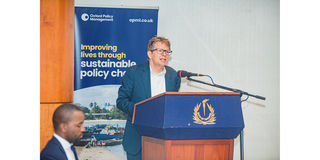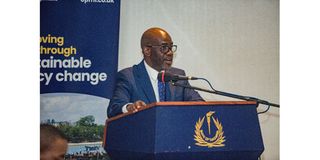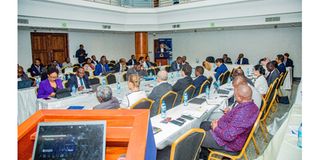Prime
Tanzania government creates team to craft new macroeconomic policy framework in the context of Vision 2050

Dr Steven Lee, Chief Economist at Oxford Policy Management, leads the advisory tea. PHOTO | JACOB MOSENDA
What you need to know:
- The economic advisory team is aimed at steering Tanzania towards its Vision2050 goals and a team of experts from various sectors would contribute to the ongoing development of the new Vision2050
Dar es Salaam. Experts have hailed the President's Office-Planning Commission for establishing an economic advisory team to develop a new Macroeconomic Policy Framework over the next three months.
The economic advisory team is aimed at steering Tanzania towards its Vision 2050 goals and a team of experts from various sectors would contribute to the ongoing development of the new Vision2050.
Unveiled recently by the executive secretary of the President's Office-Planning Commission, Mr Lawrence Mafuru, this initiative marks a significant milestone in Tanzania's economic planning.

Executive secretary of the President's Office-Planning Commission, Mr Lawrence Mafuru
Speaking in a public lecture held on Thursday, May 1, 2025, in Dar es Salaam, Mr Mafuru emphasised the pivotal role of the new framework in aligning with Vision2050, which is currently under development.
Leading the charge in facilitating this endeavour is the Chief Economist at Oxford Policy Management, Dr Steven Lee.
The expert spearheaded a public lecture to kick-start the process of formulating the new framework, highlighting its importance in driving sustainable economic growth.
The establishment of the National Macroeconomic Policy System in 2024 underscored Tanzania's commitment to enhancing the management of its national economy, it was said.
The system aims to set clear parameters, goals, and strategies to guide decision-makers and sector implementers in a coordinated manner.
The timing of the creation of the new team is poignant, as it comes nearly two decades after the inception of the last Macroeconomic Policy Framework in 2005/06-2007/08.
With evolving economic landscapes and emerging challenges, a refreshed framework is seen as a crucial step towards fostering sustainable development.
According to Mr Mafuru, the Tanzania President's Office-Planning Commission is at the forefront of driving this process.
"We have the mandate to oversee the formation of national long-term and short-term development plans and visions," he stated.
The economic advisory team, which includes stakeholders from various sectors, will assist the planning commission in preparing a new Macroeconomic Policy System in time.

The Zanzibar Planning Commission executive secretary, Dr Rahma Salum, echoed these sentiments, stressing the importance of integrating economic indicators into policy planning.
"As we strive towards achieving Vision 2050, it is essential to have tools that can guide us effectively," remarked Dr Salum.
She underlined the need to adapt to technological advancements and address climate change concerns to realise set goals successfully.
"To achieve the goals of Vision2050, we must have a strategy that focuses on the use of appropriate technology to drive development while also ensuring that we prioritise climate change and how to mitigate its impacts," she said.
Experts worldwide are increasingly recognising the pivotal role of macroeconomic policy in shaping employment outcomes.
The International Labour Organization (ILO) advocates for a transformative approach, urging policymakers to integrate macroeconomic, labour market, and sectoral policies.
In a document titled "Towards a transformative macroeconomic policy framework for employment generation in Africa," the ILO emphasises the need for comprehensive strategies to address the employment challenge on the continent.”
"As indicated by the ILO, the new policy framework has the potential to focus more on how the nation can address the increase in unemployed youth.
It will provide a platform for addressing the issue of unemployment," said an expert in economics, Dr Hamis Suphian of the University of Dar es Salaam.





